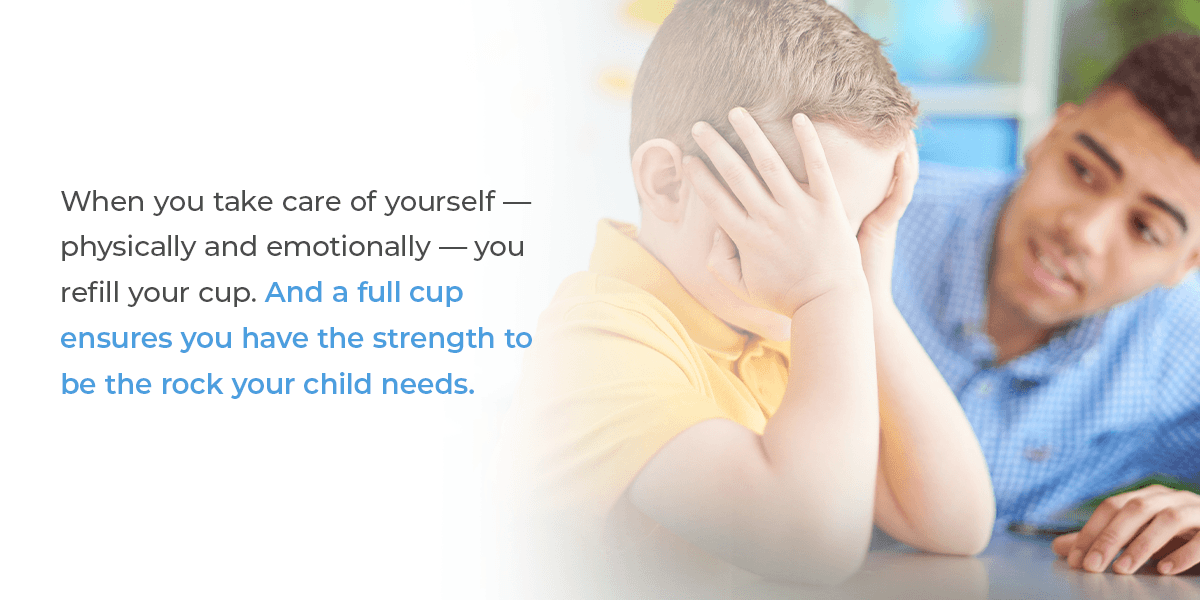Caring for yourself when your child has cancer is no easy feat. Your child's cancer diagnosis may turn your world upside down, leaving you with a whirlwind of emotions and uncertainties. As a caregiver, you pour every ounce of your energy and love into supporting your children, but it's crucial to remember — we can't pour from an empty cup.
That's why, in this blog, we're diving into the importance of self-care. We'll share practical tips to help you stay strong while providing the best support for your child.
Why Self-Care Is Important
It's easy to fall into the trap of believing that self-care is selfish. However, self-care is less about indulgence and more about sustenance. When you take care of yourself — physically and emotionally — you refill your cup. And a full cup ensures you have the strength to be the rock your child needs.
Consider the analogy of tending to a garden. Just like plants need nourishment and care to thrive, so do you. When you take the time to nurture yourself, you're replenishing your own strength and resilience. This, in turn, enables you to be a steadfast source of support for your child as they navigate cancer care.
So, embrace self-care as a tool to support your children in the best way possible. After all, when we care for ourselves, we care for our children, too.
7 Practical Self-Care Tips for Caregivers
Let's get to the heart of the matter. Here are seven practical self-care tips to follow while caring for your child.
1. Acknowledge Your Feelings
It's natural to experience a roller coaster of emotions — fear, sadness, anger, you name it. However, burying those feelings won't make them disappear. Instead, acknowledge and experience them so they don't become bottled up.
During this process, you could find solace through your care team. At Four Diamonds, our team consists of social workers, nurse coordinators, psychologists and chaplains. Each team member is specially trained to help families process and cope with complicated emotions. They help guide families through these challenging times with professional support and empathy.
Additionally, you can find support groups in your area or join online communities. You can also turn to a trusted friend. Whichever you choose, ensure you find healthy ways to express and process your emotions.
Alternatively, set aside a few minutes to reflect on your feelings and jot down your thoughts in a journal. Sometimes, simply expressing your feelings on paper can be a great outlet for your emotions.
The key is to find what works best for you and make time for it while caregiving. Your feelings are valid, and honoring them is essential.
2. Organize Help and Support
When you are responsible for the care of a child with cancer, it's easy to feel overwhelmed and stretched thin. You don't have to go through these feelings alone — lean on your support system and care team and allow others to lend a helping hand.
Identify specific tasks or responsibilities that others can help with. These tasks can include meal preparation, household chores or transportation to appointments. Then, express your needs to your support system. People often want to help but may not know how, so don't hesitate to ask for what you need.
Additionally, there may be volunteer programs or support groups that can lend a hand. Joining one may be the perfect opportunity to lighten your load while fostering a sense of community.
3. Stay Informed
To help you feel a sense of control during challenging times, ensure you stay informed. Learn and understand your child's diagnosis and treatment plan. Ask questions at appointments and take notes.
You can also seek help from professionals regarding the intricacies of medical care and finances. Some hospitals have dedicated resources like social workers and nurse coordinators. At Penn State Health Children's Hospital, Four Diamonds makes it possible for these types of specialty care providers to exclusively serve the needs of both our patients and their families.
Eligible Four Diamonds families are covered financially for their child's cancer care that is not covered by insurance. Social workers may also have solutions to help families with other financial situations that may arise.
Online resources and support groups can also be excellent sources of knowledge and help. These sources can provide many resources for caregivers, from educational materials to financial assistance programs.
4. Focus on Physical and Emotional Health
It can be challenging to focus on your physical and emotional well-being when your child is fighting cancer, but it's essential for both of you that you do so. It can help you gain enough energy to provide the care and support your child requires.
Plan an exercise routine, take a walk or try a sport. You can also schedule regular checkups and screenings to ensure you stay on top of your own health needs. Regarding emotional health, practice self-compassion. Be kind to yourself and acknowledge that caregiving during your child's cancer journey is tough. Find moments of relaxation or enjoyment in your day, whether enjoying a favorite hobby or taking a few deep breaths to center yourself.
5. Create a Support Network
Connecting with other parents going through similar experiences can be comforting. Building a support network can help you feel less isolated and more empowered during the ups and downs of cancer treatment. Connecting with others who understand the challenges firsthand provides a sense of solidarity. Our care team often pairs newly diagnosed families with others who have been through what they are going through to be there as a resource for them.
Online groups often provide a safe space to share stories, advice and encouragement. Online communities may be a more convenient way of connecting with other caregivers. From the comfort of your home, you can access support whenever needed.
6. Set Boundaries
Setting boundaries and learning to say no may be challenging, but it's crucial. Practicing healthy boundaries can help protect your well-being. To start, you can limit the time and energy you spend on nonessential commitments. Having too much on your plate while caring for your child with cancer may overwhelm you.
As you set boundaries, be kind to yourself and recognize that it's OK to feel exhausted. Avoid self-judgment and offer yourself the same empathy and understanding you would give a friend in a similar situation.
7. Seek Professional Help When Needed
It's natural to experience various emotions, from fear and sadness to anxiety and stress. Sometimes, these feelings can become too much. In these instances, know that you can seek — and benefit from — professional help.
Reach out to counselors or social workers who specialize in supporting families facing childhood cancer. These professionals can provide a safe space to process and express your emotions and experiences. Through this, they can help you develop coping techniques tailored to you.
Just as you would seek medical treatment for a physical ailment, it's equally important to focus on your mental well-being. Seeking help is a sign of strength, not weakness.
Learn How Four Diamonds at Penn State Health Children's Hospital Can Help
Caring for yourself when your child has cancer is necessary for you and your child's well-being. When you dedicate time to self-care, you may be better able to support your child through this challenging journey.
Contact Four Diamonds today if you or someone you know needs additional support. Our support services are designed to assist families through every step of the childhood cancer journey. We offer comprehensive services — including clinical psychology and music therapy — and are committed to covering 100% of our eligible families' out-of-pocket medical expenses. Together, we can conquer childhood cancer and provide the support and care that families need to thrive.


